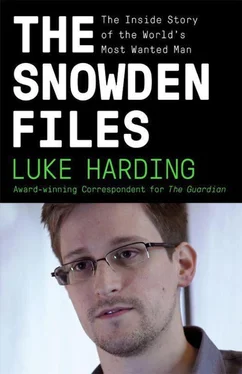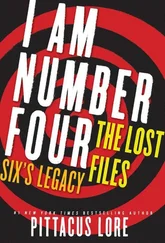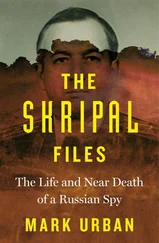Rusbridger himself was due to go off to his regular summer ‘piano camp’ in the Lot Valley in central France. He had recently published a book entitled Play it Again , an account of how he had combined demanding editing duties and the WikiLeaks story with learning Chopin’s most exacting work, ‘Ballade No. 1’. After consulting with Johnson, Rusbridger decided he might as well still go, despite all the dramas. He boarded the Eurostar train bound for Bordeaux. At first it was hard to concentrate on music. Soon, however, he immersed himself completely in Debussy.
As he worked on his piano technique, events in London now moved towards what Rusbridger would later describe as one of the strangest episodes in the Guardian ’s long history. Robbins reappeared. ‘He was punctiliously polite, very well-mannered. There was no obvious aggression,’ Johnson says. But the official said the government wanted to seize the Guardian ’s computers and subject them to forensic analysis. Johnson refused. He cited a duty to Snowden and to Guardian journalists. The deputy editor offered another way forward: to avoid being closed down, the Guardian would bash up its own ‘war room’ computers under GCHQ’s tutelage. Robbins agreed.
It was a parody of Luddism: men were sent in to smash the machines.
On Friday 19 July two men from GCHQ paid a visit to the Guardian . Their names were ‘Ian’ and ‘Chris’. They met with Guardian executive Sheila Fitzsimons. The Kremlin was apparently capable of techniques straight from the pages of James Bond, Ian told her: ‘You have got plastic cups on your table. Plastic cups can be turned into microphones. The Russians can send a laser beam through your window and turn them into a listening device.’ The Guardian nicknamed the pair the hobbits.
Two days later the hobbits came back, this time with Robbins and a formidable civil servant called Kata. Ian, the senior of the two, was short, bubbly and dressed in shirt and chinos. His accent hinted at south Wales. Chris was taller and more taciturn. They carried a large and mysterious rucksack. Neither had previously spent any time with journalists; this was a new experience for them. In normal circumstances fraternising with the media was forbidden.
Ian explained how he would have broken into the Guardian ’s secret war room: ‘I would have given the guard £5k and got him to install a dummy keyboard. Black ops would have got it back. We would have seen everything you did.’ (The plan made several wildly optimistic assumptions.) At this Kata shook her head: apparently Ian’s Boy ’s Own contribution was unwelcome.
Ian then asked: ‘Can we have a look at the documents?’ Johnson said he couldn’t.
Next, the GCHQ team opened up their rucksack. Inside was what looked like a large microwave oven. This strange object was a degausser. Its purpose is to destroy magnetic fields, thereby erasing hard drives and data. The electronics company Thales made it. (Degaussers were named after Carl Friedrich Gauss, who gave his name to the Gauss unit of magnetism.)
The pair were not so much good cop/bad cop – more bad cop/silent cop.
Ian: ‘You’ll need one of these.’
Johnson: ‘We’ll buy our own degausser, thanks.’
Ian: ‘No you won’t. It costs £30,000.’
Johnson: ‘OK, we probably won’t then.’
The Guardian did agree to purchase everything else the government spy agency recommended: angle-grinders, Dremels – a drill with a revolving bit, masks. ‘There will be a lot of smoke and fire,’ Ian warned, adding, with grim relish: ‘We can call off the black helicopters now…’
At midday the next day, Saturday 20 July, the hobbits came back again. They joined Johnson, Blishen and Fitzsimons in a windowless concrete basement three floors down. The room was unoccupied, but crowded with relics from a bygone newspaper age: linotype machines used for setting pages in the 1970s, and giant letters spelling ‘The Guardian’ which had once adorned the paper’s old office in the Farringdon Road.
Dressed in jeans and T-shirts and directed by Ian, the three Guardian staff took it in turns to smash up bits of computer: black squares, circuit boards, chips. It was sweaty work. Soon there were sparks and flames. And a lot of dust.
Ian lamented that because of the GCHQ revelations he would no longer be able to tell his favourite joke. Ian used to go to graduate recruitment fairs looking to attract bright candidates to a career in government spying. He wrapped up his speech by saying: ‘If you want to take it further, telephone your mum and tell her. We will do the rest!’ Now, he complained, the spy agency’s press office had forbidden the gag.
As the bashing and deconstruction continued, Ian revealed he was a mathematician – and a pretty exceptional one. He said that 700 people had applied the year he joined GCHQ, 100 had been interviewed, and just three hired. ‘You must be quite clever,’ Fitzsimons observed. ‘Some people say so,’ Ian answered. Chris rolled his eyes. The two GCHQ men took photos with their iPhones. When the smashing was finally completed, the journalists fed the pieces into the degausser, like small children posting shapes into a box. Everyone stood back. Ian bent forward and watched. Nothing happened. And still nothing. Then finally a loud pop.
It had taken three hours. The data was destroyed, beyond the reach of Russian spies with trigonometric lasers. The hobbits were pleased. Blishen felt wistful. ‘There was this thing we had been protecting. It had been completely trashed,’ he says. The spooks and the Guardian team shook hands; Ian dashed off. (He said he was in a bit of a rush, because he had a wedding the next day.) The hobbits obviously didn’t come down to London often. They left carrying bags of shopping: presents for their families.
‘It was an extremely bizarre situation,’ Johnson says. The British government had compelled a major newspaper to smash up its own computers. This extraordinary moment was half pantomime, half-Stasi. But it was not yet the high tide of British official heavy-handedness. That was still to come.
Silicon Valley, California
Summer 2013
‘Until they become conscious, they will never rebel.’
GEORGE ORWELL,
1984
It was an iconic commercial. To accompany the launch of the Macintosh in 1984, Steve Jobs created an advert that would captivate the world. It would take the theme of George Orwell’s celebrated dystopian novel and recast it – with Apple as Winston Smith. His plucky company would fight the tyranny of Big Brother.
As Walter Isaacson recounts in his biography of Jobs, the Apple founder was a child of the counterculture. He practised Zen Buddhism, smoked pot, walked around barefoot and pursued faddish vegetarian diets. He embodied the ‘fusion of flower power and processor power’. Even as Apple grew into a multi-billion dollar corporation, Jobs continued to identify with computing’s early subversives and long-haired pioneers – the hackers, pirates, geeks and freaks that made the future possible.
Ridley Scott of Blade Runner fame directed the commercial. It shows Big Brother projected on a screen, addressing lines of workers. These skinhead drones wear identical uniforms. Into the grey nightmare bursts an attractive young woman. She wears orange shorts and a white tank top. She is carrying a hammer! Police in riot gear run after her. As Big Brother announces ‘We shall prevail’, the heroine hurls the hammer at him. The screen explodes in a blaze of light; the workers are open-mouthed. A voice announces smoothly: ‘On January 24th, Apple Computer will introduce Macintosh. And you’ll see why 1984 won’t be like 1984 .’
Читать дальше












